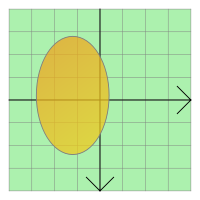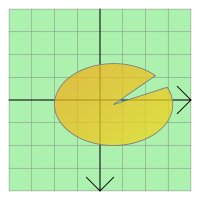QGraphicsEllipseItem Class Reference
The QGraphicsEllipseItem class provides an ellipse item that you can add to a QGraphicsScene. More...
#include <QGraphicsEllipseItem>Inherits QAbstractGraphicsShapeItem.
This class was introduced in Qt 4.2.
Public Functions
| QGraphicsEllipseItem ( QGraphicsItem * parent = 0 ) | |
| QGraphicsEllipseItem ( const QRectF & rect, QGraphicsItem * parent = 0 ) | |
| QGraphicsEllipseItem ( qreal x, qreal y, qreal width, qreal height, QGraphicsItem * parent = 0 ) | |
| ~QGraphicsEllipseItem () | |
| QRectF | rect () const |
| void | setRect ( const QRectF & rect ) |
| void | setRect ( qreal x, qreal y, qreal width, qreal height ) |
| void | setSpanAngle ( int angle ) |
| void | setStartAngle ( int angle ) |
| int | spanAngle () const |
| int | startAngle () const |
Reimplemented Public Functions
| virtual QRectF | boundingRect () const |
| virtual bool | contains ( const QPointF & point ) const |
| virtual bool | isObscuredBy ( const QGraphicsItem * item ) const |
| virtual QPainterPath | opaqueArea () const |
| virtual void | paint ( QPainter * painter, const QStyleOptionGraphicsItem * option, QWidget * widget = 0 ) |
| virtual QPainterPath | shape () const |
| virtual int | type () const |
- 6 public functions inherited from QAbstractGraphicsShapeItem
- 177 public functions inherited from QGraphicsItem
Additional Inherited Members
- 2 static public members inherited from QGraphicsItem
- 24 protected functions inherited from QGraphicsItem
Detailed Description
The QGraphicsEllipseItem class provides an ellipse item that you can add to a QGraphicsScene.
QGraphicsEllipseItem respresents an ellipse with a fill and an outline, and you can also use it for ellipse segments (see startAngle(), spanAngle()).
|
|
To set the item's ellipse, pass a QRectF to QGraphicsEllipseItem's constructor, or call setRect(). The rect() function returns the current ellipse geometry.
QGraphicsEllipseItem uses the rect and the pen width to provide a reasonable implementation of boundingRect(), shape(), and contains(). The paint() function draws the ellipse using the item's associated pen and brush, which you can set by calling setPen() and setBrush().
See also QGraphicsPathItem, QGraphicsRectItem, QGraphicsPolygonItem, QGraphicsTextItem, QGraphicsLineItem, QGraphicsPixmapItem, and Graphics View Framework.
Member Function Documentation
QGraphicsEllipseItem::QGraphicsEllipseItem ( QGraphicsItem * parent = 0 )
Constructs a QGraphicsEllipseItem. parent is passed to QAbstractGraphicsShapeItem's constructor.
See also QGraphicsScene::addItem().
QGraphicsEllipseItem::QGraphicsEllipseItem ( const QRectF & rect, QGraphicsItem * parent = 0 )
Constructs a QGraphicsEllipseItem using rect as the default rectangle. parent is passed to QAbstractGraphicsShapeItem's constructor.
See also QGraphicsScene::addItem().
QGraphicsEllipseItem::QGraphicsEllipseItem ( qreal x, qreal y, qreal width, qreal height, QGraphicsItem * parent = 0 )
Constructs a QGraphicsEllipseItem using the rectangle defined by (x, y) and the given width and height, as the default rectangle. parent is passed to QAbstractGraphicsShapeItem's constructor.
This function was introduced in Qt 4.3.
See also QGraphicsScene::addItem().
QGraphicsEllipseItem::~QGraphicsEllipseItem ()
Destroys the QGraphicsEllipseItem.
QRectF QGraphicsEllipseItem::boundingRect () const [virtual]
Reimplemented from QGraphicsItem::boundingRect().
bool QGraphicsEllipseItem::contains ( const QPointF & point ) const [virtual]
Reimplemented from QGraphicsItem::contains().
bool QGraphicsEllipseItem::isObscuredBy ( const QGraphicsItem * item ) const [virtual]
Reimplemented from QGraphicsItem::isObscuredBy().
QPainterPath QGraphicsEllipseItem::opaqueArea () const [virtual]
Reimplemented from QGraphicsItem::opaqueArea().
void QGraphicsEllipseItem::paint ( QPainter * painter, const QStyleOptionGraphicsItem * option, QWidget * widget = 0 ) [virtual]
Reimplemented from QGraphicsItem::paint().
QRectF QGraphicsEllipseItem::rect () const
Returns the item's ellipse geometry as a QRectF.
See also setRect() and QPainter::drawEllipse().
void QGraphicsEllipseItem::setRect ( const QRectF & rect )
Sets the item's ellipse geometry to rect. The rectangle's left edge defines the left edge of the ellipse, and the rectangle's top edge describes the top of the ellipse. The height and width of the rectangle describe the height and width of the ellipse.
See also rect() and QPainter::drawEllipse().
void QGraphicsEllipseItem::setRect ( qreal x, qreal y, qreal width, qreal height )
Sets the item's rectangle to the rectangle defined by (x, y) and the given width and height.
This convenience function is equivalent to calling setRect(QRectF(x, y, width, height))
See also rect().
void QGraphicsEllipseItem::setSpanAngle ( int angle )
Sets the span angle for an ellipse segment to angle, which is in 16ths of a degree. This angle is used together with startAngle() to represent an ellipse segment (a pie). By default, the span angle is 5760 (360 * 16, a full ellipse).
See also spanAngle(), setStartAngle(), and QPainter::drawPie().
void QGraphicsEllipseItem::setStartAngle ( int angle )
Sets the start angle for an ellipse segment to angle, which is in 16ths of a degree. This angle is used together with spanAngle() for representing an ellipse segment (a pie). By default, the start angle is 0.
See also startAngle(), setSpanAngle(), and QPainter::drawPie().
QPainterPath QGraphicsEllipseItem::shape () const [virtual]
Reimplemented from QGraphicsItem::shape().
int QGraphicsEllipseItem::spanAngle () const
Returns the span angle of an ellipse segment in 16ths of a degree. This angle is used together with startAngle() for representing an ellipse segment (a pie). By default, this function returns 5760 (360 * 16, a full ellipse).
See also setSpanAngle() and startAngle().
int QGraphicsEllipseItem::startAngle () const
Returns the start angle for an ellipse segment in 16ths of a degree. This angle is used together with spanAngle() for representing an ellipse segment (a pie). By default, the start angle is 0.
See also setStartAngle() and spanAngle().
int QGraphicsEllipseItem::type () const [virtual]
Reimplemented from QGraphicsItem::type().

